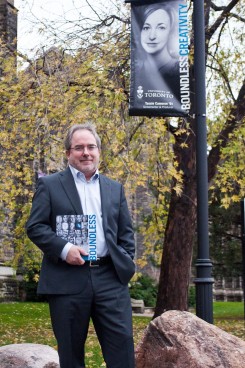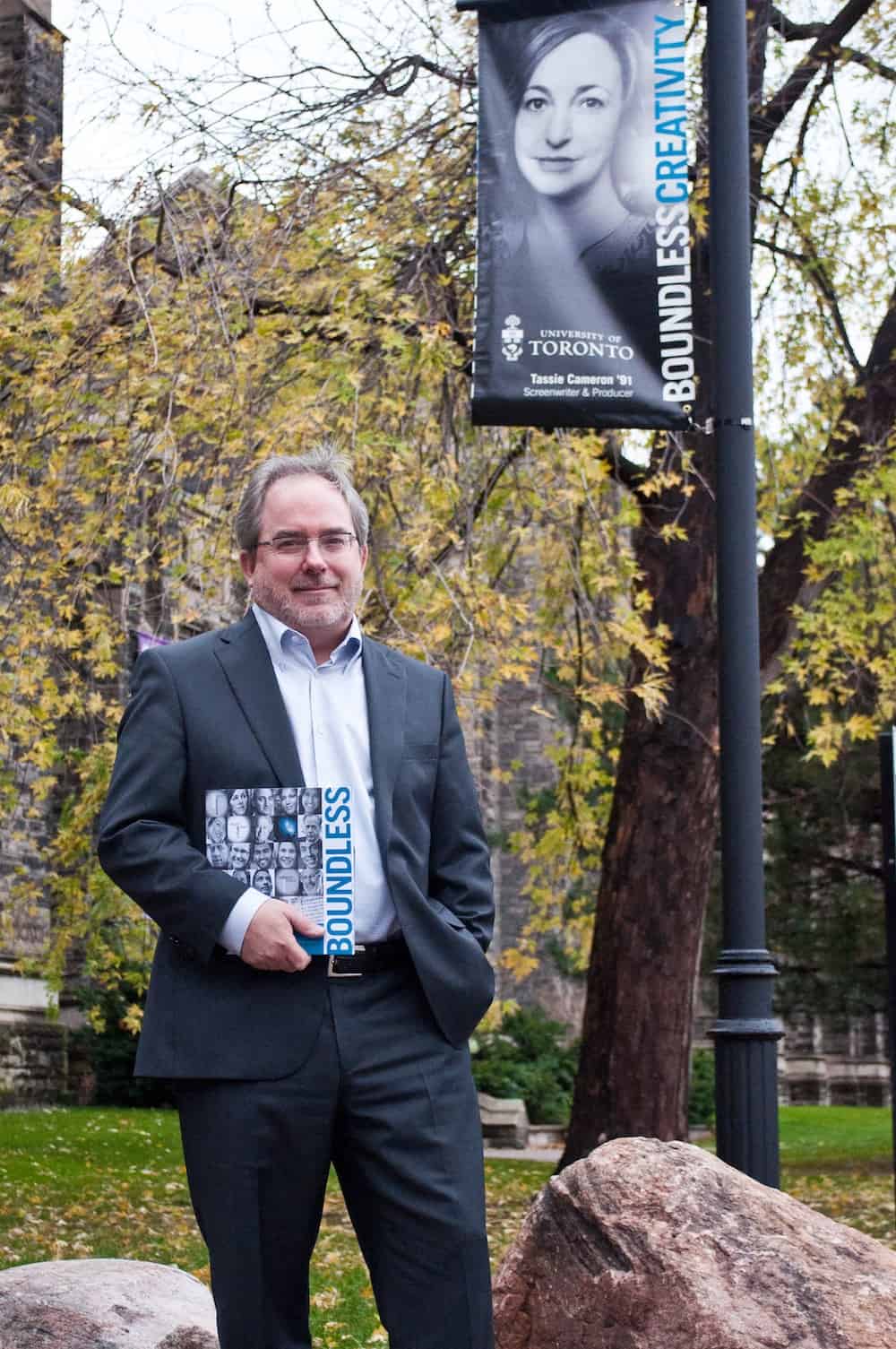Construction has become a fact of life at this university.
There are, of course, some negative aspects to this constant. The roar of backhoes and bulldozers interspersed around campus can become irritating at times. Worksites, vast tracts of dirt and concrete, and spiderwebs of half-assembled steel girders rising slowly toward the sky are admittedly unsightly. In some cases, there may be reason to question whether what is being built is more valuable than what was destroyed to make way for it, as was the case for the Back Campus project.

Vice-President of Advancement David Palmer poses with the Boundless handbook in front of Simcoe Hall. SARAH TAGUIAM/FILE PHOTO
But, at its core, construction is growth, and growth is survival. Every building erected, every faculty member employed, every research initiative seen through is a sign that the University of Toronto is alive, thriving, and well-financed. U of T is currently engaged in a fundraising initiative, titled the Boundless campaign. Launched in 2011, the project seeks to raise $2 billion in donations. As of September 27, it has collected $1.35 billion of this sum. Before the university’s most recent campaign, 15 years ago, U of T typically raised below $20 million per year in donations. For Boundless, the school seeks to collect at least $200 million per year, a figure it has well exceeded thus far. This is made possible, in part, by the work of the University Advancement Division, and of David Palmer, vice-president, advancement.
“Last year, for instance, we raised $226 million,” says Palmer, “Of course that money lands in a lot of different places around the university. Every single department, college, faculty, and campus participates in the campaign. They all benefit, and in fact, the fundraising that was done has gone into all of these divisions.”
The vice-president is soft-spoken and businesslike, possibly a practised affect, but at any rate one that is likely useful for persuading generous volunteers like Peter Munk, Judy and Blake Goldring, and Joseph Rotman to contribute to the university. “We do very little advertising or direct solicitation,” he explains. “By far the majority of money we raise, probably well in excess of 90 per cent, is by face-to-face meetings with individuals and corporations that have an interest in supporting us.”
Boundless has, of course, explored many different avenues of fundraising: alumni receive mailers and telephone calls encouraging them to give, flags advertising U of T’s Boundless are ubiquitous on campus, and the administration has hosted impressive galas in several strategically important locales, such as Silicon Valley and Hong Kong, to raise awareness of the university’s projects.
“We really needed to be out there with a very strong statement of the nature of this university, its importance to society, its importance to this community, and what it is we’re going to do, what we’re going to stand for, and why it matters. And that’s the key phrase: why it matters,” emphasizes Palmer, the subtlest hint of conviction entering his quiet speech. “I’ve had direct conversations with alumni that have said, ‘You know, I knew you were going to do something, but I wasn’t sure what. But now that I’ve been exposed to this, I’m really impressed with what you’re doing in this area and that area, and I’m going to give some thought to my gift to the campaign, and instead of giving “x”, I might give “x times 2” or “x times 3.”’”
The vice-president lists some of these possible areas of interest: “We raise money for some of the most exciting academic projects that you’ve ever come across, whether those projects are coming out of medicine, or engineering, or they’re coming out of English, history, or they’re coming out of UTM, UTSC, these are the projects that drive philanthropy,” he says. “The quality of our ideas, the quality of our people, those are the things that drive people to come to the table and be generous toward the university.” Palmer’s vocabulary in describing these grand endeavours is fairly mercenary, likely because money is important to all of them.
This reality has proven quite challenging to the administration at times. Government grants to the university have effectively been frozen for two decades now. U of T’s tuition is one of the lowest in the world for an institution of its calibre. As he discusses these obstacles, Palmer shares a rueful smile with Michael Kurts, assistant vice-president, university relations, who has been silently taking notes on the meeting. Perhaps most damagingly, the university’s entire endowment (as well as its Pension Master Trust fund) is managed and invested by the University of Toronto Asset Management Corporation (UTAM). While its returns have been between reasonable and impressive most years, in 2008, as a result of the worldwide financial crisis, UTAM lost $600 million of the university’s $2.1 billion endowment. The Advancement Division’s work, including the Boundless campaign, has gone some distance to alleviate this; U of T’s endowment sat at $1.896 billion at the end of 2012.
These gains have come with remarkable efficiency. Palmer describes how Boundless has spent on average $0.15 for every $1.00 it has raised, an almost sevenfold return, which is far better than Revenue Canada’s recommended rate of $0.35 per $1.00 raised.
The effects of this yield reverberate throughout the university and, ultimately, allow it to be a school. “I think raising money for faculty has huge direct benefits for students,” says Palmer. “When you look at all of our top faculty, our Canada Research chairs, our endowed chairs, our major award winners, over 90 per cent of them teach undergraduates. There are not many universities, in Canada or elsewhere, that can come anywhere close to that statistic.”
“We have new buildings like the Rotman School, like the law school, like the Goldring Centre; those are three examples of capital projects where there’s very significant support for students built into them, and we’ve been very successful at raising funds for those capital projects, because either they’re tied to the need for expansion or to very poor facilities that have been existing for some time and been degrading over time.”
This is the surest sign of Palmer’s success: the University of Toronto is building.
With files from Anthony Marchese


